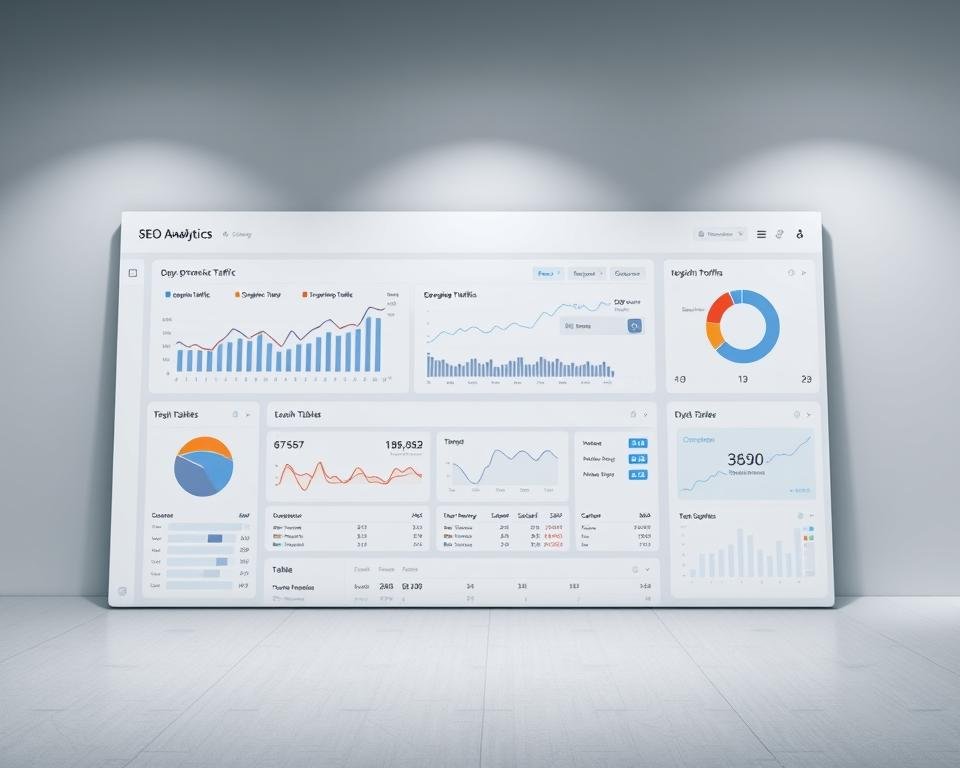As a blogger, it’s key to improve your SEO skills. This helps your website get seen more and get more visitors. Search engine rules keep changing, so it’s important to know the newest SEO techniques.
I’ll show you the best places for SEO training. These courses will help you grow your blogging career. They teach you how to make your content better for search engines.
Key Takeaways
- Discover the top platforms for free SEO courses.
- Learn how to improve your blogging with SEO training.
- Understand why keeping up with new SEO techniques is important.
- Find out how to make your website more visible and get more visitors.
- Explore detailed SEO courses to boost your blogging career.
Understanding the Basics of SEO
In today’s digital world, SEO is key for bloggers wanting to grow. As I explore blogging, I see that knowing SEO is vital for a strong online presence.
What is SEO?
SEO means “Search Engine Optimization.” It’s about making your website better for search engines. This includes keyword research, content optimization, and link building. By doing this, you can get more people to visit your site.
SEO is all about knowing what people search for. It’s about giving them what they want to find. This way, your site can rank higher in search results.
Why is SEO Important for Bloggers?
For bloggers, SEO is very important. It makes your content more visible. This means more people can find your blog posts. It’s also key for reaching the right audience with the right keywords.
- SEO builds trust with your readers.
- It makes your content more useful and relevant.
- SEO is cheaper than paid ads.
Learning the basics of SEO can really help bloggers. It boosts their online presence and helps them meet their content goals.
Essential SEO Terminology
Learning SEO terms is key to boosting your blogging skills. Bloggers must know important SEO terms to do well. These terms are the base of search engine optimization.
Keywords
Keywords are what people search for online. Finding the right keywords is important for bloggers. It helps your posts show up in search results.
Good keyword research finds terms that match your content and are searched often. Google Keyword Planner is a helpful tool for this.
Backlinks
Backlinks are links from one site to another. They show a site’s credibility and popularity. Backlinks are key for SEO, showing your content is valuable.
To get good backlinks, make your content linkable. Engage with other bloggers and consider guest blogging.
SERP (Search Engine Results Page)
The SERP is what search engines show when you search something. Knowing how SERPs work and how to rank well is important for SEO.
SERPs have both free results and ads. As a blogger, aim for better organic rankings.
Best Platforms for Free SEO Courses
Many platforms offer free SEO courses to help you improve your skills. These sites are great for learning about SEO. They help you understand SEO better.
Coursera
Coursera works with top schools to teach many subjects, including SEO. Their courses cover basic and advanced topics. One great thing about Coursera is that you can learn at your own pace.
Udemy
Udemy has lots of courses, including SEO. You can find both free and paid courses here. Udemy’s SEO courses include practical exercises and examples from real life.
LinkedIn Learning
LinkedIn Learning, or Lynda.com, has video courses on SEO. It’s good for people who learn better from videos. LinkedIn Learning’s courses cover everything from basics to advanced strategies.
These sites offer free SEO courses and flexible learning. They help you improve your SEO skills. You can also keep up with new trends and best practices.
Top Free SEO Courses for Beginners
Learning SEO is key to better blogging. I’m excited to share some great free resources with you. For beginners, it’s important to learn the basics first. Here, I’ll show you some top free SEO courses for starting your SEO journey.
Google’s Search Engine Optimization Starter Guide
Google’s Search Engine Optimization Starter Guide is a detailed resource. It teaches the basics of SEO. You’ll learn about how search engines work and the importance of keywords.
It also offers practical tips for improving your site’s ranking. It’s a must-read for anyone wanting to improve their blogging skills with SEO.
Moz’s Beginner’s Guide to SEO
Moz’s Beginner’s Guide to SEO is another great resource for beginners. It explains complex SEO concepts simply. It covers everything from the basics to advanced techniques.
This guide is perfect for those new to SEO. By following it, you’ll understand SEO better and apply it to your blogging skills training.
| Course | Key Features | Benefit |
|---|---|---|
| Google’s SEO Starter Guide | Comprehensive overview, keyword research, site optimization | Improves understanding of SEO fundamentals |
| Moz’s Beginner’s Guide to SEO | Easy-to-understand explanations, covers basics to advanced SEO | Enhances blogging skills through SEO knowledge |
Both resources help build a strong SEO foundation. By using these free courses, you can boost your blogging skills. They’re perfect for beginners or those looking to improve their SEO knowledge.
Intermediate SEO Courses to Level Up
Once I’ve learned the basics of SEO, it’s time to dive into more advanced courses. These courses will help me improve my blogging skills. I’m looking for lessons that cover SEO strategies, like technical SEO, link building, and content optimization.
HubSpot’s SEO Training Course
HubSpot’s SEO Training Course is perfect for bloggers wanting to improve their SEO skills. It covers many topics, from keyword research to on-page SEO and link building. After finishing, I get a certificate, which boosts my professional portfolio.
Key Features of HubSpot’s SEO Training Course:
- Comprehensive coverage of SEO fundamentals
- Practical tips for improving website rankings
- Certificate upon completion
Yoast Academy: SEO for Beginners
Yoast Academy’s SEO course, even though called “for Beginners,” is great for intermediate learners. It teaches how to optimize my WordPress site for search engines. I learn about meta tags, content optimization, and internal linking.
Benefits of Yoast Academy’s SEO Course:
- Detailed guidance on WordPress SEO
- Best practices for content optimization
- Regular updates to reflect the latest SEO trends
To compare these courses, I’ve made a table with their main features:
| Course Features | HubSpot’s SEO Training Course | Yoast Academy: SEO for Beginners |
|---|---|---|
| Comprehensive SEO Coverage | Yes | Yes |
| Certificate Upon Completion | Yes | No |
| Focus on WordPress SEO | No | Yes |
By using these intermediate SEO courses, I can greatly improve my blogging skills. Whether it’s HubSpot’s detailed training or Yoast Academy’s WordPress SEO tips, I’m ready to take my blog to the next level.
Advanced SEO Strategies
For experienced bloggers, learning advanced SEO is key to beating rivals. The digital world keeps changing. It’s vital to know the newest strategies to boost your blog’s online presence.
Advanced SEO means exploring complex areas like technical audits, advanced link building, and deep keyword research. These methods help make your blog stand out.
SEMrush Academy: SEO Fundamentals
SEMrush Academy has a detailed course on SEO Fundamentals. It covers important topics for bloggers wanting to improve their SEO skills. The course includes:
- Technical SEO: How to make your website better for search engines to crawl and index.
- Keyword Research: How to find the right keywords and phrases for your content.
- Link Building: Ways to get high-quality backlinks to boost your site’s authority and ranking.
By finishing this course, bloggers get a strong base in SEO. They can make smart choices about their SEO plans.

Advanced Technical SEO by Google
Google’s Advanced Technical SEO course is for those diving deep into SEO’s technical side. It covers advanced topics like:
- Advanced Crawling and Indexing: How to make your site better for search engines to crawl and index.
- Technical Audits: How to do detailed technical audits to find and fix SEO problems.
- Mobile-First Indexing: How to make your site ready for mobile-first indexing, meeting Google’s latest rules.
This course is perfect for seasoned bloggers who want to improve their technical SEO skills. It helps them stay on top of the game.
SEO Tools You Should Know
Exploring SEO, I see how vital the right tools are. Bloggers need tools to track traffic, analyze competitors, and spot improvement areas. This helps in making SEO strategies work.
Popular SEO tools include Google Analytics, SEMrush, and Ahrefs. They offer insights into website performance, keyword rankings, and backlinks. This helps bloggers make informed decisions to boost their SEO.
Google Analytics
Google Analytics gives deep insights into website traffic. It shows visitor numbers, page views, and bounce rates. Bloggers can use this to better understand their audience and create content that meets their needs.
Key Features of Google Analytics:
- Traffic analysis
- Audience demographics
- Behavioral insights
- Conversion tracking
SEMrush
SEMrush is a complete SEO tool with many features. It helps with keyword research, competitor analysis, and technical SEO audits. Bloggers can use it to find ways to improve their website’s visibility and ranking.
Key Features of SEMrush:
| Feature | Description |
|---|---|
| Keyword Research | Identify relevant keywords and phrases |
| Competitor Analysis | Analyze competitors’ strengths and weaknesses |
| Technical SEO Audit | Identify technical issues affecting website performance |
Ahrefs
Ahrefs offers insights into backlinks, keyword rankings, and content performance. It helps bloggers refine their SEO strategies and boost their website’s online presence.
Key Features of Ahrefs:
- Backlink analysis
- Keyword ranking tracking
- Content analysis
Using these SEO tools, bloggers can understand their website’s performance better. They can make informed decisions to improve their SEO. These tools are key for success in the competitive SEO world, whether you’re starting or looking to improve.
Applying SEO Techniques to Your Blog
Good blogging is more than just writing. It’s about knowing SEO. To make your blog better, you need to use SEO tricks well.
Optimizing Blog Posts
It’s key to make your blog posts easy for search engines to find. Use keywords smartly in your posts, like in the start and in subheadings.
Here are some tips for making your blog posts better:
- Put keywords naturally in your writing, mainly in the first part.
- Make your meta descriptions catchy to get more clicks from search results.
- Your content should be top-notch, fun, and useful to readers.
- Use header tags (H1, H2, H3) to organize your content and highlight key points.
| Optimization Technique | Description | Benefit |
|---|---|---|
| Keyword Usage | Using relevant keywords in your content. | Improves search engine ranking. |
| Meta Descriptions | Writing compelling meta descriptions. | Increases click-through rates. |
| Content Quality | Creating high-quality, engaging content. | Enhances reader experience and loyalty. |
Crafting SEO-Friendly Titles
Making good titles is an art that helps your blog get seen more. Your title should tell what your post is about, include your main keyword, and be interesting enough to get clicks.
Tips for making SEO-friendly titles:
- Put your main keyword at the start of your title.
- Keep your title short but clear.
- Use action words or questions to grab attention.
By using these SEO tips, you can get better at blogging and make your blog work better. Remember, SEO is always changing. You need to keep up with new trends and updates.
Tracking Your SEO Progress
Tracking SEO progress helps you make your strategies better. You need to know about analytics and watch key SEO metrics.
Understanding Analytics
Analytics tools show how your website does in search engines. Google Analytics is a great tool that gives lots of info. It tells you about your website’s traffic, how people engage, and how many conversions you get.
To start with analytics, set up your account. Then, learn the dashboard. Look for audience demographics, behavior flow, and goal completions.

Common SEO Metrics to Monitor
There are important SEO metrics to watch. These include:
- Organic Traffic: The number of visitors from search engines.
- Bounce Rate: The percentage of visitors who leave without doing anything else.
- Conversion Rate: The percentage of visitors who do what you want them to (like filling out a form).
- Average Session Duration: How long visitors stay on your site.
By watching these metrics, you can find what needs work. For example, if your bounce rate is high, your content might not be good enough.
Keep an eye on your SEO progress. Make choices based on data. This will help your website rank better and get more visitors.
Staying Updated with SEO Trends
To stay ahead, bloggers must keep up with SEO changes. The SEO world is always moving, with new trends and rules coming out often. It’s key to stay informed to keep a blog visible and ranked well.
Following Industry Blogs
Following industry blogs is a great way to learn about new SEO trends. These blogs share the latest news, tips, and updates. Moz, Ahrefs, and Search Engine Journal are some top blogs to check out.
By reading these blogs often, bloggers can get important info and stay ahead.
Engaging in Webinars
Webinars are also a great way to learn about SEO trends. They let experts share their knowledge and the latest strategies. By joining webinars, bloggers can learn from pros and meet others in the field.
HubSpot and SEMrush often host webinars on SEO topics.
By using insights from blogs and webinars, bloggers can really understand the latest SEO trends. This helps them improve their blogging skills.
The Importance of Continuous Learning in SEO
The world of SEO is always changing. This makes it key to keep learning to succeed. Bloggers must keep up with new search engine updates and methods.
To get better at blogging, knowing the latest SEO trends is a must. It’s not just about the basics. You also need to learn advanced strategies.
Adapting to New Algorithms
Google and other search engines often change their rules. These changes affect how content is seen and ranked. Bloggers need to keep up with these updates to stay ahead.
Here are some ways to stay informed:
- Follow industry leaders and blogs
- Take part in webinars and online courses
- Join SEO communities
Expanding Your Skillset
It’s important to grow your skills in SEO. Learning new tools and strategies can boost your blogging abilities.
For example, knowing how to use tools like Google Analytics, SEMrush, and Ahrefs is helpful. They give you insights into your blog’s performance.
| SEO Tool | Primary Function | Benefit to Bloggers |
|---|---|---|
| Google Analytics | Website traffic analysis | Understand audience behavior and track SEO performance |
| SEMrush | Competitor analysis and keyword research | Identify gaps and opportunities in your SEO strategy |
| Ahrefs | Backlink analysis and content optimization | Improve your content’s visibility and authority |
By always learning and growing, you can improve your blogging skills. This keeps you competitive in SEO.
Spending time on SEO training is worth it. It helps you optimize your blog better. This brings more visitors and boosts your online presence.
Conclusion: Start Your SEO Journey Today!
Starting your SEO journey is exciting. It begins with learning the basics and then moving to more advanced techniques. By using the top free SEO courses, you can improve your blogging skills and boost your online presence.
To start learning, look for the Best free SEO courses that match your skill level. Whether you’re new to SEO or want to get better, there are many resources to help you.
Resources for Further Education
For more learning, check out Moz, HubSpot, and SEMrush Academy. These sites have detailed guides, tutorials, and courses on SEO. They keep you up-to-date with the latest trends and algorithms. This ensures your blogging skills stay sharp in the changing digital world of Top Free SEO Courses to Boost Your Blogging Skills.
